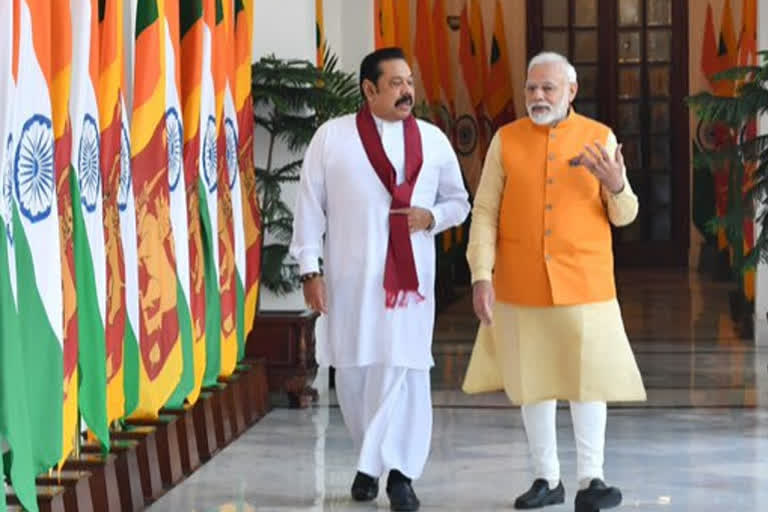New Delhi: With new Sri Lankan Foreign Secretary Jayanath Colombage asserting that Colombo will always follow an "India First" foreign policy, a leading expert who closely follows India-Sri Lanka relations has said that it is not surprising as the island nation is always dependent for its external security on New Delhi.
In an interview to a local TV channel earlier this month soon after being appointed to the post, Colombage said that Sri Lanka wants to pursue a neutral foreign policy but will retain its "India First" policy in terms of strategic and security measures.
"President (of Sri Lanka Gotabaya Mahapksa) has stated in terms of strategic security, we will follow an 'India First' policy," he stated.
"We cannot afford to be a strategic security threat to India and we don't have to be. We need to benefit from India. The President has clearly said that you are our first priority as far as security is concerned but I have to deal with other players for economic prosperity."
Colombage also added that along with pursuing a neutral foreign policy, Sri Lanka will also protect India's strategic interests.
Speaking to ETV Bharat, N. Sathiya Moorthy, Distinguished Fellow at the Observer Research Foundation think tank and head of its Chennai Initiative, said that Colombage's statement is nothing surprising but what is new is that the statement has been so comprehensive.
Read:'Sri Lanka will adopt India first approach'
"Colombage reiterated (Sri Lanka's 'India First' policy) but for the first time such a comprehensive statement has come," Moorthy said. "He has been very articulate."
He said that both Sri Lanka and the other Indian Ocean nation of the Maldives follow an "India First" foreign policy because of security concerns.
"Both countries know that they can't handle external security as individual island nations. They know that the security on the waters around them is linked to that of India," Moorthy pointed out.
He said that Colombage, a retired admiral of the Sri Lanka Navy, is the first defence person to be appointed as foreign secretary of the country and hence security interests will remain a priority.
Read:India reaches out to Bangladesh amid China's growing influence
In his interview to the TV channel, Colombage also said that handing over the Hambantota port to China on a 99-year lease was a mistake and efforts are now on to correct this.
The first phase of the maritime port was opened in November 2010. Total estimated construction cost of the Phase 1 of the project is $361 million, out of which 85 per cent was funded by the EXIM Bank of the China.
However, the port in 2016 made a revenue of $11.81 million and incurred expenses of $10 million as direct and administrative costs to report an operating profit of just $1.81 million.
As the port incurred heavy losses, making debt repayment difficult, in 2016 it was proposed to lease 80 per cent of the port in a debt-for-equity swap to the China Merchants Ports holding company (CMPort), who will invest $1.12 billion to revive the port under a public–private partnership.
Read:China's words don't reflect its actions against India: Ex-envoy
Then, in July 2017, the Sri Lanka Ports Authority (SLPA) and China Merchant Port Holdings signed an agreement to lease the port to China Merchant Port Holdings for 99 years. The government of Sri Lanka kept the ownership of the port and leased it out for 99 years. The deal gave the Sri Lankan government $1.4 billion, that they will be using to pay off the debt to China.
Observers saw this leasing out of the port as Colombo leaning towards Beijing away from New Delhi. China has also been criticised by various international quarters for putting countries in the region under debt traps under President Xi Jinping's pet Belt and Road Initiative
However, Moorthy said that, contrary to popular perception, Sri Lanka never leaned towards China and Colombo had first offered the port to New Delhi. But India showed little interest in funding a costly and massive port construction project in the underdeveloped fishing village of Hambantota, a district that had been crushed by the Indian Ocean tsunami in 2004.
Read:India-Japan ties not against any third country: Expert
It was only then that China entered the port project as a usurer, according to Moorthy.
"India has no problems with Chinese investments in Sri Lanka," he said. "New Delhi is only concerned about protecting its own security interests."
In this context, Moorthy said that President Gotabaya had told Prime Minister Narendra Modi that Sri Lanka will not work against India's interests.
India continues to be a key development aid partner of Sri Lanka and the two countries enjoy close ties under New Delhi's Neighbourhood First policy.
